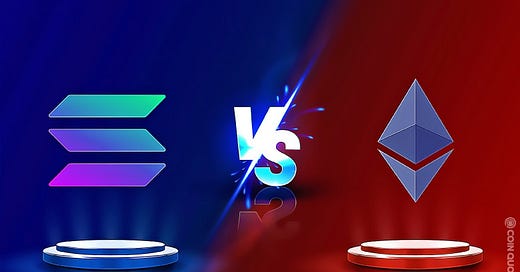⚔️ NFT battle heats up
SOL to outpace ETH, Google's new crypto move, OpenSea buys Dharma Labs, and more.
Hey 👋
Welcome to the mesha tribe. A biweekly newsletter by mesha that brings you valuable insights from finance, biz, and tech to help you take your net worth #ToTheMoon🚀
Sounds good? Sign up below 👇
Awesome! let’s get started.
First up,
Market Recap 📈
Indian benchmark indices continued to fall for the third consecutive day amid broad-based selling led by a sharp plunge in tech stocks. Meanwhile, the US stocks were also lower as investors remained concerned over rising bond yields and tighter monetary policy.
Sensex: 59,464.62 (-1.06%) ↓
Nifty 50: 17,757.00 (-1.01%) ↓
Dow Jones: 35,028.65 (-0.96%) ↓
Nasdaq 100: 15,047.84 (-1.07%) ↓
Bitcoin: $42,082.27
Top Stories 📰
1. Solana could beat Ethereum on NFTs: JPMorgan
2022 hasn't been that great for major cryptocurrencies. While NFT sales are sky-high, the prices of digital currencies like Bitcoin and Ethereum are tumbling hard. And if this continues, they might start to lose their market dominance to rivals like Solana and Cardano…which is exactly what JPMorgan predicts.
According to its new analyst report, Ethereum's congestion risk and high gas fees can cost the entire network to lose its NFT market share to rival Solana. The network's NFT market share has already plunged from 95% to nearly 80% at the start of 2021, and if sustained this year, could become “a bigger problem” its valuation, the Wall Street giant added.
Earlier, JPMorgan also said that Ethereum’s dominance of DeFi was also at risk, giving its rivals like Cardano an opportunity to seize its market share. For context, Ethereum's DeFi market share now stands at 70% from 100% at the start of 2021.
Solana offers a faster and cheaper alternative to NFT developers. But critics have consistently denounced the platform for its centralization, which has caused the network several outages in recent months.
Currently, Ethereum is still the dominant blockchain for NFTs and DeFi.
Why it matters? NFTs are now the fastest-growing universe in the crypto ecosystem. While Ethereum leads the NFT market, its sky-high transaction costs have been a major complaint of traders since its inception. To tackle this, Ethereum developers are working on a crucial network update to increase the network's capacity (aka sharding), but it won’t be out until next year.
2. Google to integrate crypto payments
Mainstream adoption is just around the corner as Google prepares its foray into the crypto world.
The search engine giant has hired former Paypal executive Arnold Goldberg to run its payments division. The decision comes after Google ditched its plans to add bank accounts to Google Pay last year. Instead, it now aims to push aggressively towards a wide range of financial services, including crypto.
Despite its global dominance, Google Pay has struggled to gain traction for its payment’s platform as compared to Apple, which leads mobile adoption. This is where Google can use Goldberg's expertise as he led PayPal's transition into crypto back in 2020. He also helped the payment services giant by gradually expanding its offering by launching crypto payments for merchants and integrations with its Venmo app.
While Google has avoided including virtual currencies as part of its financial services, it has been slowly dipping its toes in the market. In April 2021, Google first collaborated with global crypto exchange Gemini to facilitate Bitcoin purchases through Google Pay. More recently, it partnered with crypto platform Bakkt to let customers trade goods and services using select cryptocurrencies.
Shortly after the news, Bitcoin rose to $42,478 before falling back down to $42,082.27.
Why it matters? Crypto is here to stay and Google realizes it. For years, its massive consumer reach coupled with its huge balance sheet allowed it to offer payment services for free—a competitive advantage that the company isn't ready to give away anytime soon. And now it's planning to double down on its efforts by launching more payment features within its search and shopping service.
Deal Street 🤑
Tom Brady's NFT startup raises Series B
Autograph, a platform that helps entertainers and athletes launch and promote their NFTs, has raised $170 million in its Series B funding round. Led by investors Kleiner Perkins and Andreessen Horowitz, the fundraise received participation from Lightspeed Venture partner Nicole Quinn and Katie Haun’s new venture firm. The Los Angeles-based firm, co-founded by NFL star Tom Brady last year in July, allows fans to purchase these exclusive assets from marketplaces such as OpenSea and DraftKings Inc. So far, it has launched NFT collections featuring Tom Brady, Naomi Osaka, The Weekend, Tiger Woods, Tony Hawk, and Simone Biles. The fresh funding will go towards scaling its NFT technology and collaborating with the world's most iconic sports and entertainment partners.
OpenSea acquires Dharma Labs
NFT marketplace OpenSea has purchased crypto wallet firm Dharma Labs just two weeks after landing an astonishing $13.3B valuation. The revelation comes after Axios first reported the deal, estimated to be somewhere between $110-$130 million. The acquisition will make Dharma's CEO, Nadav Hollander, the new CTO of OpenSea, while OpenSea's current CTO, Alex Atallah, will step into a new position to oversee the company's NFT and Web3 ecosystem developments. Dharma lets users connect their bank accounts and facilitates buying and swapping of tokens. But, as part of the deal, OpenSea will shut down Dharma’s app, allowing users a month-long time to offload their wallets.
Tweet Of The Week ✨

Share what you learn 🤝
Found this newsletter insightful? Well, then forward it to your friends and colleagues. Or share it on your social media.
Want to discuss the above stories yourself? Join us.
See ya next week. Bye! 👋







